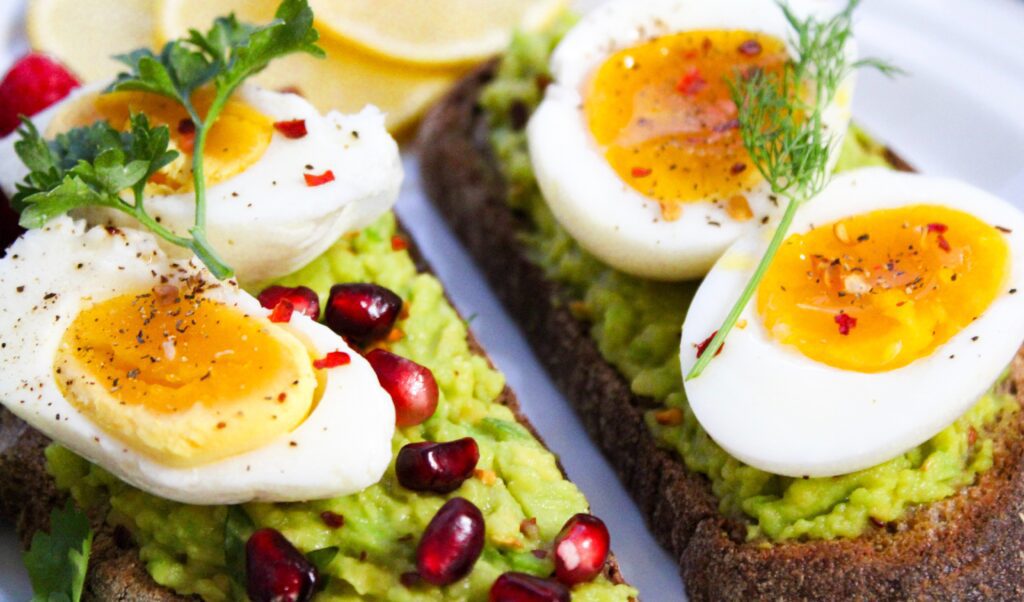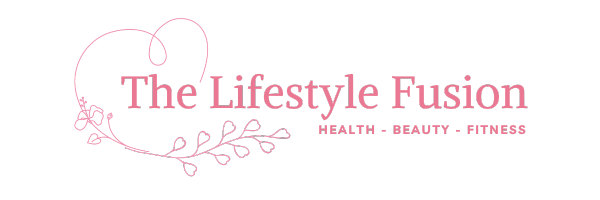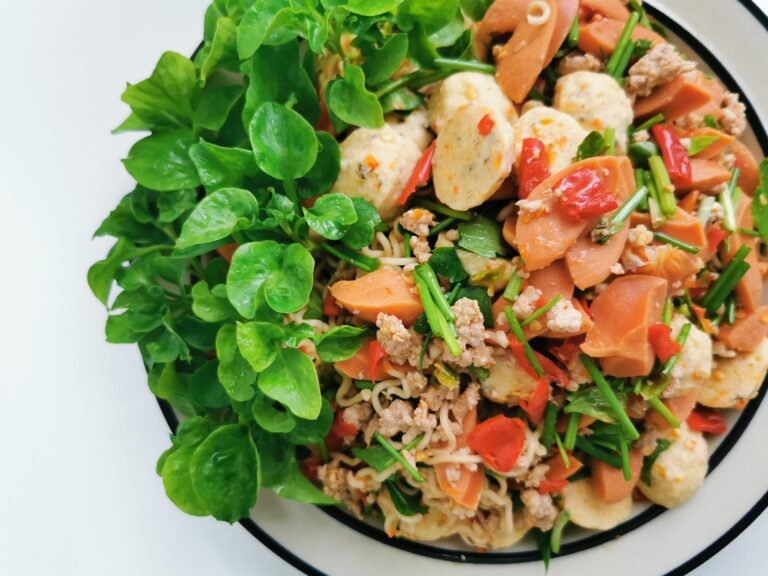Healthy eating for weight loss is meant to incorporate your intake of whole grains, high-protein, sugar-free, and less oily food. This way you can positively impact your weight management and well-being. Eating clean can help you to reach your weight loss goals healthily and sustainably.
Healthy eating for weight loss is a consistent and multi-faceted approach that involves making food choices, managing portion sizes, and including regular physical activity in your daily routine. Weight loss is simply derived from a formula, that burns more calories than your intake. In addition, weight loss is a life-long commitment, not just following a diet for a few weeks to drop kilograms.
Healthy Eating For Weight Loss: 13 Key Points
There is a detailed guide to help you understand the key points of healthy eating for weight loss including:
1. A Well-balanced Diet
Focus on a balanced diet that includes a variety of nutrient-rich foods. This typically involves:
-
Proteins:
Lean sources like chicken, turkey, fish, tofu, legumes, and low-fat dairy. Protein helps you feel full and preserves muscle mass during weight loss.
-
Carbohydrates:
Go for complex carbohydrates like whole grains, fruits, and vegetables. These provide sustained energy and fiber to keep you full.
-
Fiber:
Fiber-rich foods, like whole grains, fruits, vegetables, and legumes, promote fullness and aid digestion.
-
Healthy Fats:
Include sources of healthy fats such as avocados, nuts, seeds, and olive oil in moderation. Healthy fats are essential for overall health.
2. Calorie Deficit
Weight loss ultimately comes down to consuming fewer calories than you burn. This is known as a calorie deficit. To create a deficit, you can either reduce your calorie intake increase your physical activity, or a combination of both.
3. Hydration
Consuming enough water is crucial for overall health and can help control appetite. Sometimes, thirst is mistaken for hunger.
4. Regular Exercise
Combine a balanced diet with regular physical activity. Aim for a mix of aerobic (cardio) exercise and strength training to help burn calories, build muscle, and boost your metabolism.
5. Mindful Eating
Pay attention to what you eat. Eating slowly and savoring each bite can help prevent overeating. Avoid distractions like TV or smartphones during meals.
6. Portion Control
Be mindful of portion sizes. Use measuring cups, a kitchen scale, or visual cues to help control your portions. Overeating, even healthy foods, can lead to weight gain.
7. Frequent Meals
Some people find it helpful to eat smaller, more frequent meals to control hunger and prevent overeating. However, this varies from person to person, so find a pattern that works best for you.
8. Limit Processed Foods
Highly processed foods often contain added sugars, unhealthy fats, and excess calories. Minimize your consumption of sugary snacks, sugary drinks, and foods with excessive additives.
9. Meal Planning
Plan your meals to make healthier choices. Prepare healthy snacks to avoid reaching for unhealthy options when you’re hungry.
10. Gradual Changes
Avoid crash diets or extreme calorie restrictions, as these are not sustainable. Gradual, long-term changes to your eating habits are more likely to lead to lasting weight loss.
11. Patience
Weight loss takes time. Be patient and realistic about your goals. Aim for a sustainable, gradual rate of weight loss, typically around 1-2 pounds per week.
12. Accountability
Keep a food journal or use a calorie-tracking app to monitor your intake. This can help you stay aware of what you’re eating and make necessary adjustments.
13. Consult a Healthcare Professional
If you have specific dietary needs or health conditions, consider consulting a registered dietitian or healthcare provider to create a personalized weight loss plan.
During your weight loss journey, remember that there is no one-size-fits-all approach to healthy eating for weight loss. It’s important to find a plan that works for you and is feasible in the long term. Also, you need to focus on overall health and well-being rather than just the number on the scale. Last but not least, always mind that you are losing weight and heading towards fat to fit, and do not worry if you are facing your weight loss plateau stage while following any diet plan. Because your body responds to what your mind thinks. So always think positively and believe me, you will get positive results for sure. Be happy and satisfied. This thing will help you in your weight loss journey. Weight loss should be a part of a broader commitment to a healthier lifestyle.
1500 Calorie High Protein Diet Plan

A 1500 calorie high protein diet plan focuses on an effective way to support weight loss and maintain muscle mass. To lose your fast, replace carbs and fat with protein. Because it helps you to reduce the hunger hormone and boost up many satiety hormones. Eventually, it causes a major reduction in hunger and is the main reason protein helps you to lose weight. It can make you eat fewer calories naturally.
There is a sample meal plan for a day that provides around 1500 calories with an emphasis on protein, you can modify it according to your own choices but mind that the choices should be based only on less carb, high protein food. A high protein, low carb diet plan is as follows:
Breakfast (Approx. 350-400 calories):
Scrambled Eggs: 2 large eggs cooked with non-stick cooking spray or a small amount of olive oil (140-160 calories)
Spinach and Tomato: Sauté a handful of spinach and tomatoes (20-30 calories)
Whole-grain Toast: 1 slice (80-100 calories)
Low-fat Greek Yogurt: 6 oz. (100-120 calories)
Noon Snack (Approx. 150-200 calories):
Cottage Cheese: 1/2 cup (100 calories)
Berries (strawberries, blueberries, etc.): 1/2 cup (25-50 calories)
Almonds or Walnuts: 1 oz. (25-50 calories)
Lunch (Approx. 400-450 calories):
Grilled chicken Breast: 4 oz. (150-180 calories)
Quinoa or Brown Rice: 1/2 cup (100-125 calories)
Mixed Vegetables: Steamed or sautéed (100-150 calories)
Avocado: 1/4 (50-60 calories)
Olive oil and Apple-cider Vinegar (for dressing): 1-2 tablespoons (50-60 calories)
Evening Snack (Approx. 100-150 calories):
Carrot and Cucumber Sticks: Serve with 2 tablespoons of hummus (100-150 calories)
Dinner (Approx. 350-400 calories):
Baked Fish or Tofu: 4 oz. (150-180 calories)
Steamed Broccoli or Green Beans: 1 cup (40-50 calories)
Quinoa or Brown Rice: 1/2 cup (100-125 calories)
Sliced Lemon or a light sauce for flavor (20-50 calories)
Before Bed: Take 1 Cup of any herbal tea along with a lemon slice
5 Points to Remember
This 1500 calorie high protein diet plan provides you with a good balance of protein, healthy fats, and complex carbohydrates to help you stay satisfied while supporting healthy eating for weight loss goals. To get the desired results, note these key principles as follows:
- Individual calorie needs vary based on factors such as age, gender, activity level, and metabolic rate.
- It is vital to consult a healthcare professional or registered dietitian before starting any calorie-restricted diet to ensure it aligns with your specific health goals.
- This meal plan is a starting point and can be adjusted based on your preferences and dietary restrictions.
- Be sure to stay hydrated by drinking plenty of water throughout the day.
- Consider adding in exercise to achieve the best results.
Alert: Who is discouraged from following this diet plan?

A high-protein diet is generally discouraged for patients with certain medical conditions and health concerns. Individuals with these conditions need to consult a healthcare professional or a proper registered dietitian before making significant dietary changes. Some conditions for which a high-protein diet may not be recommended include:
1. Liver Disease
In cases of advanced liver disease, excessive protein intake can be challenging for the liver to process. Individuals with liver conditions may need to limit protein intake under the guidance of a healthcare provider.
2. Kidney Disease:
High-protein diets can put extra strain on the kidneys, which may be harmful for individuals with kidney disease. People with kidney issues may need to limit their protein intake, especially if they have advanced kidney disease.
3. Osteoporosis:
High-protein diets can increase the excretion of calcium through the urine, potentially affecting bone health. This may be of concern for individuals at risk of osteoporosis.
4. Gout:
Gout is a type of arthritis that can be triggered or exacerbated by the consumption of purine-rich foods, including some high-protein sources like organ meats and certain seafood. Patients with gout may be advised to moderate their protein intake.
5. Certain Metabolic Disorders:
Some rare metabolic disorders, such as phenylketonuria (PKU), require strict dietary management and restriction of specific amino acids, which can be found in protein-rich foods.
6. Heart Disease:
While lean protein sources can be part of a heart-healthy diet, very high-protein diets that are also high in saturated fats can be detrimental for individuals with heart disease.
7. Dehydration:
High-protein diets can lead to increased water loss due to increased urine output. Individuals with a history of dehydration or those at risk for dehydration should be cautious with high-protein diets.
8. Digestive Issues:
Some individuals with digestive problems, such as irritable bowel syndrome (IBS) or Crohn’s disease, may find high-protein diets difficult to tolerate.
9. Hypertension
Hypertension (high blood pressure) patients are not completely recommended to consider a high-protein, as part of a broader approach to managing their condition, but it should be done with caution and medical guidance. While protein-rich foods can support blood pressure regulation, very low-carb diets may not be ideal because they can lead to increased saturated fat intake from sources like red meat, which could negatively affect heart health. It’s essential for hypertensive individuals to prioritize heart-healthy fats, and complex carbohydrates, and to monitor their sodium intake.
10. Breastfeeding Mothers:
A high protein diet for breastfeeding moms is partially deniable because breastfeeding mothers should prioritize a balanced diet that includes complex carbohydrates, such as whole grains and fruits, in addition to protein sources like lean meats, fish, and dairy. Here, it’s important to do so with caution and under the guidance of a healthcare professional. While it’s crucial to get an adequate amount of protein to support both the mother’s and the baby’s nutritional needs, a very low-carb diet can potentially lead to reduced milk supply and insufficient energy levels.
To sum up, it is essential to understand that healthy eating for weight loss means not to take only ‘high-protein’ by a hair’s breadth, it can vary in its definition. What is considered high for one person may not be for another. Protein needs are also influenced by factors such as age, sex, activity level, and overall health. Before making significant dietary changes, individuals with medical conditions must work with healthcare professionals, such as a registered dietitian or a doctor, who can provide personalized guidance and ensure that their diet is both safe and appropriate for their specific health needs.






